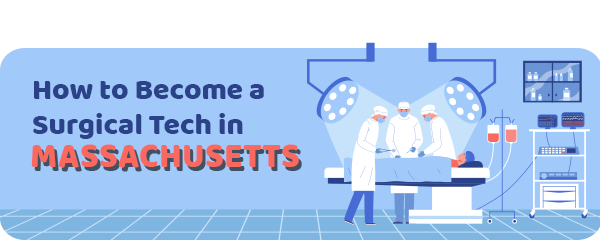Massachusetts is home to a dedicated team of healthcare professionals who operate in surgical settings.
This skilled team is essential for the success of surgical procedures and comprises various specialists.
Among them are surgeons, anesthesia experts, surgical nurses, and surgical technicians.
Surgical techs are commonly known by alternative titles like operating room (OR) techs and scrub techs.
Article Table of Contents
Surgical Technologist Job Description and Duties
The role of a surgical technologist encompasses a diverse range of responsibilities during their shifts.
These responsibilities include, but are not limited to:
- Preparing patients for surgery
- Transporting patients to and from the OR
- Preparing the OR with surgical equipment and supplies
- Monitoring the instrument count throughout surgery
- Handing the surgeon medical instruments
- Closing wounds and bandaging patients
It’s crucial to note that the duties of surgical technologists extend beyond this list and encompass a broader spectrum of responsibilities.
Surgical Technologist Training and Education
The path to becoming a surgical technologist in Massachusetts begins with obtaining a high school diploma or an equivalent qualification like a GED.
Aspiring surgical technologists then enroll in specialized training programs specifically designed to provide essential education and clinical training.
The curriculum typically covers subjects such as:
- Microbiology,
- Pathophysiology,
- Pharmacology,
- Anatomy,
- Physiology,
- Medical terminology
Students usually also receive training in life-saving techniques like CPR and/or BLS and/or AED.
Several reputable institutions in Massachusetts offer surgical technology training programs, each with its own unique features.
Bunker Hill Community College 
Situated in Boston, the school provides a comprehensive certificate program in surgical technology designed for completion within 11 months.
During the spring semester, students engage in practical training at local hospitals for two days per week, progressing to full-time hospital work in June and July.
As part of the admission process, students are subject to both Criminal Offender Record Information (CORI) and Sex Offender Registry Information (SORI) checks, the outcomes of which may influence program acceptance.
The current in-state tuition stands at $4,855 per semester.
Calhoun Community College 
This school’s program extends over a duration of approximately two years, comprising classroom, laboratory, and clinical components.
In pursuit of an Associate in Applied Science (AAS) degree, students are expected to fulfill an additional 18 credits in general education coursework.
To gain admission, prospective students are required to complete an online application, attend a program information session, successfully pass a Manual Dexterity Exam, and meet the college’s specific admission criteria.
Massachusetts Bay Community College 
Thus institution also presents a certificate program in surgical technology.
Applicants are required to:
- Undergo CORI and SORI checks
- Possess either a Healthcare Provider Card from the American Heart Association or a CPR/AED for the Professional Rescuer Card from the American Red Cross
- These are the sole accepted CPR certifications for this program.
Completion of the program is achievable within one year, and tuition costs range from $7,000 to $14,000 for residents, with non-residents facing tuition fees of $15,000 to $18,000.
Quincy College 
Quincy College offers a swift 10-month certificate program in surgical technology.
CORI and SORI checks are mandatory during the admission process.
The tuition for this program amounts to approximately $5,524 per semester.
North Shore Community College 
This school features an engaging certificate program in surgical technology that can be finalized within one year.
The curriculum covers a wide array of subjects including:
- Medical terminology
- Anatomy
- Pharmacology
- Surgical techniques
- Instrumentation
- Patient care methods
Applicants are required to hold a high school diploma or its equivalent, a GED.
Tuition costs for Massachusetts residents amount to $4,706 per semester, while non-residents face a tuition fee of $7,756.
| School Name | Address |
|---|---|
| Bunker Hill Community College | 250 New Rutherford Ave, Boston, MA 02129 |
| Calhoun Community College | online |
| Massachusetts Bay Community College | 50 Oakland St, Wellesley, MA 02481 |
| Quincy College | 1250 Hancock St, Quincy, MA 02169 |
| North Shore Community College | 1 Ferncroft Rd, Danvers, MA 01923 |
Becoming a Certified Surgical Technologist in Massachusetts
While certification is not a legal requirement for surgical technologists, many employers in Massachusetts prefer candidates who hold certifications from well-recognized certifying bodies.
In Massachusetts, surgical technologists can earn certification through organizations like:
- National Surgical Assistant Association (NSAA)
- Provides the Certified Surgical Assistant (CSA) qualification
- National Board of Surgical Technology and Surgical Assisting (NBSTSA)
- Provides the Certified Surgical Technologist/Certified First Assistant credential
- National Center for Competency Training (NCCT)
- Provides the Tech in Surgery Certification
The NBSTSA certification is highly reputable and nationally recognized.
This certification exam consists of 200 questions, and a minimum score of 119 correct answers is required to pass.
There is an associated fee for taking the exam, with different rates for members and non-members of the Association of Surgical Technologists (AST).
Certification renewal is mandatory every four years.
It can be achieved by either:
- Retaking the certification exam
- You’ll have to pay both the renewal fee and the exam fee
- Completing continuing education requirements
- It involves earning 60 education credits during the renewal period.
Surgical Technologist Salary in Massachusetts
Surgical technologists in Massachusetts earn an annual income of approximately $56,000.
The following table identifies specific cities in Massachusetts where surgical technologists may earn higher salaries compared to other areas of the state.
Annual Salary Range:| Location | Avg. Annual Salary |
|---|---|
| Newton | $58,000 |
| Revere | $58,000 |
| Malden | $58,000 |
| Arlington | $58,000 |
| Boston | $58,000 |
| Charlestown | $58,000 |
| Marblehead | $57,900 |
| Lynnfield | $56,400 |
| Weymouth | $56,200 |
| Mansfield | $56,200 |
Regional Salary in Massachusetts
| Region | Employed | Avg. Annual Salary | Avg. Hourly Pay | Top 10% Annual Salary | Bottom 10% Annual Salary |
|---|---|---|---|---|---|
| Barnstable Town, MA | 40 | $75,730 | $36.41 | $91,580 | $61,550 |
| Boston-Cambridge-Newton, MA-NH | 1,680 | $80,100 | $38.51 | $124,970 | $49,160 |
| Pittsfield, MA | 30 | $79,510 | $38.23 | $86,290 | $56,850 |
| Springfield, MA | 180 | $74,520 | $35.83 | $85,490 | $58,850 |
| Worcester, MA | 190 | $66,890 | $32.16 | $83,010 | $44,930 |
* Employment conditions in your area may vary.
Frequently Asked Questions
Can a Surgical Tech From Massachusetts Choose a Specialty?
YES!
Just like surgeons can choose to operate on a specific body part, so can these techs.
Here are the most commonly chosen surgery niches:
- General surgery,
- Ob/gyn,
- Urology,
- Plastics,
- Neurology
Where Do Surgical Technologists from Massachusetts Find Work?
These technologists usually work in a hospital’s surgery wing.
Furthermore, these other places also hire such specialists:
- Children’s hospitals
- Cosmetic surgery centers
- Specialty clinics for surgical procedures
What Sills Do I Need To Work As A Surgical Tech in Massachusetts?
Here are the most important skills this profession requires:
- Able to work as part of a team
- Detail-oriented
- Take direction
- Understanding medical terms
- Understanding medical methodology
- Good communication skills
Read the full guide: How to Become a Surgical Technologist




